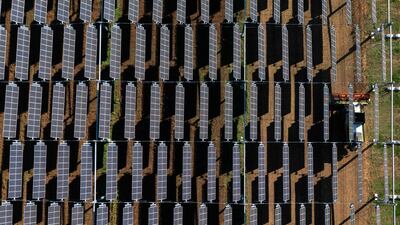The world needs to double its renewable power targets for 2030 to achieve net zero emissions, the International Renewable Energy Agency (Irena) has said.
Countries aim to reach 5.4 terawatts of installed renewable capacity by the end of the decade, about half of the 10.8 terawatts of capacity required, according to Irena’s scenario that restricts temperature increases to 1.5C above pre-industrial levels.
Abu Dhabi-based Irena said its estimate was "readily achievable" as current renewable targets lagged behind recent deployment levels.
“Furthermore, renewable power targeted by 2030 remains concentrated in a few regions globally. Asia makes up half of the global targeted capacity, followed by Europe and North America,” Irena said in the Renewable Energy Targets in 2022: A guide to design report.
In comparison, the Mena region account for only 3 per cent of global targets for 2030, despite the region’s high potential. Sub-Saharan Africa accounts for slightly more than 2 per cent of of the global target for 2030.
Although members of the G20 — the world’s biggest economies — make up 90 per cent of the total renewable power capacity target, the least developed countries and developing island states are expected to double their current capacity, Irena said.
“There is a need for real urgency. Despite some progress, the energy transition is far from being on track,” Irena director general Francesco La Camera said.
“Any near-term shortfall in action will further reduce the chance of keeping 1.5C within reach.”
Last month, the International Energy Agency said that investment in renewable energy needed to double to more than $4 trillion by the end of the decade to meet net-zero emissions targets by 2050.
The IEA’s stated policies scenario (Steps), which is based on the latest policy settings worldwide, expects clean energy investment to rise to slightly more than $2 trillion by 2030.
The Irena report was released at the UN Climate Change Conference Cop27 being held in Sharm El Sheikh in Egypt.
Thousands of policymakers and experts have gathered in the resort city to refocus efforts on reducing emissions and managing climate change.
Only 12 out of the 183 parties to the Paris Agreement have committed to having a percentage of renewables in their overall energy mixes, the report found.
About 80 per cent of the countries have "quantified" targets for their renewable energy goals, with the vast majority focusing on the power sector, Irena said.
The report assesses the level of renewable energy ambition in national climate pledges and benchmark targets against the Paris Agreement’s goal of limiting temperature rise to 1.5°C above pre-industrial levels.
Capital investment in renewables is set to hit $494 billion in 2022, surpassing the upstream oil and gas sector at $446bn for the year, according to Norway-based consultancy Rystad Energy.
The high gas prices, caused by Russian cuts, have pushed up the market rate for electricity, generating excess profits in coal, nuclear, wind and solar generation despite producers being less affected by the increase in gas costs.

